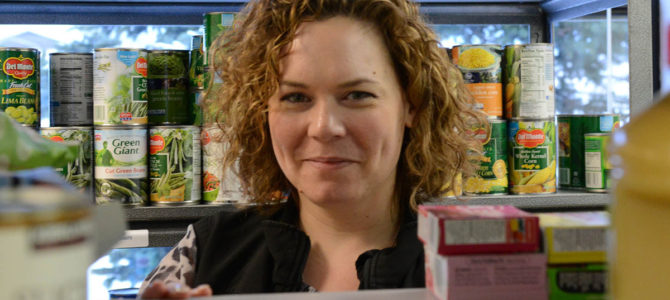
A few years ago, I lost my job. I went to work like it was any normal day, and just after lunch they called several of us in and announced they were terminating our positions. I left that day without a job or a plan.
After graduating college, I had started working at minimum wage and steadily rose, taking every available opportunity I could find. My income increased along with it, but at under $30,000 a year, I struggled month-to-month. I had no savings and, since this was the end of the month, had a new round of bills ahead of me. I felt absolutely and profoundly helpless.
I did not qualify for unemployment, since I had resigned rather than be “fired,” as did many coworkers. I had put money into a 401(k) over the years and had a few thousand available once taxes were taken. I planned to live off that as long as I could, which might cover two months. I also took daily medications and my health insurance ended a few days after the end of my job. I couldn’t afford the high price of temporary insurance, and government assistance programs took time to access.
I remember sitting on my couch a week or so later, crying as I realized my highly driven job-hunting was not getting the results I’d hoped for. I never considered myself irresponsible, although I was never good at managing money. I had always taken care of myself and managed to get by somehow. But in that moment, it felt impossible. I had applied for so many positions and didn’t know what else I could do. I knew my time was running out before bills would quickly become past due and begin accumulating.
Thankfully, I Wasn’t Alone in the World
A close friend called our rabbi, who reached out to people in our community. Within a day, she called me into her office and handed me a check. She assured me that any help I needed, she would do her best to find for me, and she did. For two years, as I drove an hour to one job then back to a second, she was always there offering me just that little, but absolutely vital, bridge between months.
Members of my community gave me food, clothing, and other odds and ends they thought I might need. During one of the most frightening and frustrating times in my life, they made it easier to get through each day.
I applied for hundreds of jobs and finally found a wonderful opportunity. I got the job, took a deep breath, and my rabbi was one of the very first people I told. Soon after, I was finally able to send money to that same account she had used to help me so many times, just as many other people in our community do regularly.
I have shared this story with people many times, and I often get two different responses. More liberal-leaning people blame the cruelty of capitalism and the lack of government funding and outreach. The more conservative praise those who helped me through charity.
I can appreciate the merits of both. While conservatives support the right of businesses to hire and fire at will, anyone who has lost a job unfairly knows the associated fear and frustration. The Right can sometimes rely too heavily on “You should have saved money and been prepared” as a principled response, and that can sound tone-deaf to those of us honestly doing our best.
On the other side, the Left far too often places responsibility solely on businesses and governments, positioning anyone struggling as at their mercy. They view situations like mine as proof more government handouts and regulation are needed.
The consequence, of course, is that in an effort to protect the vulnerable, Americans allow higher taxes and thus bring home less money each month to save and prepare for such vulnerability. As the GOP strives to reduce government waste and abuse, those who find themselves in a difficult and frightening position may find it harder to get back on their feet. Neither party responds to this scenario in a way that provides the best answers.
Americans Don’t Need to Be Forced to Help Others
While the Left tends to warn of the unfairness of the rich getting more money, many Americans just want to have enough of their own to do more than simply “get by.” But Americans also seem to appreciate what they feel is a government-provided “safety net.” In 2011, according to a report in Forbes citing Census Bureau data, 49 percent of American households received government benefits. After including Obamacare subsidies, it was closer to 52 percent. In 2012, 21 percent of Americans relied on government assistance each month. When surveyed this year, only about 12 percent of Americans wish to cut many government programs, including Medicaid.
Yet witness the incredible generosity Americans show in times of crisis. When Hurricane Harvey devastated Texas this past year, conservative Iraq War veteran and congressional candidate Jesse Kelly received so many donations after his plea to help the people affected, he had to ask people to stop sending Amazon orders. The donations were simply overwhelming. People will help when asked; I know firsthand.
I am hopeful for the changes coming to our tax code, despite cynical arguments about how little average Americans are likely to receive in comparison to more wealthy people. When you have enough to not only cover your needs, but can help other people, you feel an indescribable sense of peace and purpose. While we, as a society, seem to place hope in our government, we act by personally taking care of each other when in need. Having more money available thanks to tax cuts and smaller government allows the average person to give if inspired.
Government Programs Crowd Out Charity
My help came from small donations from many people. When people have enough, or even barely enough, they always give what they can. The Left consistently undervalues this aspect of American society. But there is an uncomfortable truth here as well.
Our country is deeply in debt. Nearly, if not more than, half of our population has experienced the need for government assistance. Nearly a quarter rely on it completely month-to-month. Our collective faith in government has made it harder for citizens to save money as costs increase and government funding needs increase more accordingly. It becomes harder to give.
Self-reliance is true security, as seeking government assistance places you under their control. But self-reliance is not always clear-cut and easy to obtain. There must be a balance that allows individuals to achieve freely without losing everything in a moment’s notice. While there are many ways to discuss that concept, one thing is certain. If you find yourself in need, all you have to do is ask, and people will help you.
As we bicker over how the government can best use our money, we must remember that genuine charity comes from the hearts and actions of individuals, not faceless agencies. The solution is never to align yourself under the protection of a government that sees you as part of a budget. But the Right must also never forget its instinct to give when needed due to principled views on personal responsibility and financial planning. Anyone could need help at any time, and while we do well to preach the values of self-reliance, we must also remember the fragility of our society and that many things are difficult to plan for.
The answer is not to give in to the Left’s fear-mongering about mass devastation from even the slightest cuts to government programs. We have a responsibility to prevent imposing the progressive belief in total government care of citizens. But keep in mind the lives around you and how many truly struggle to sustain themselves at this point in their journey.
Conservative values lift everyone up, but there is no shame in reaching up for help or reaching down to give it. Charity saves lives, and it is the core of our nation’s spirit of generosity. A little more money each paycheck helps make that easier to be a part of.








